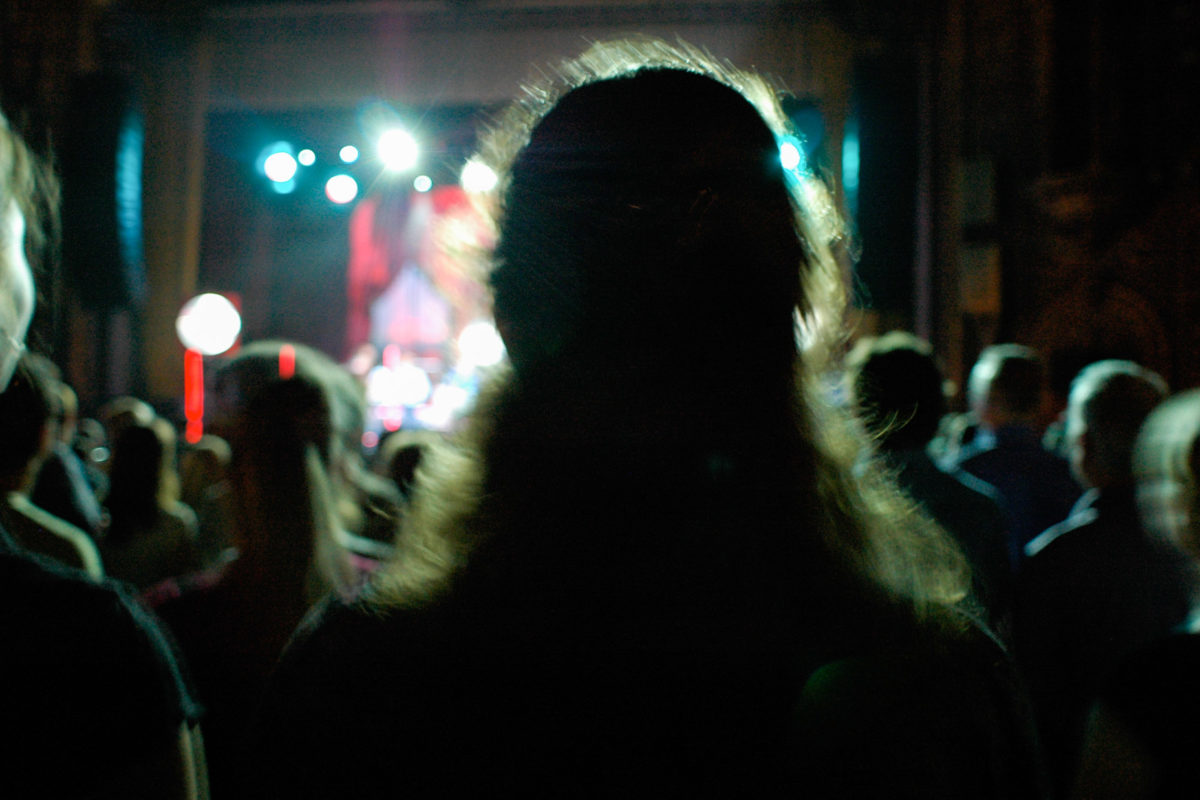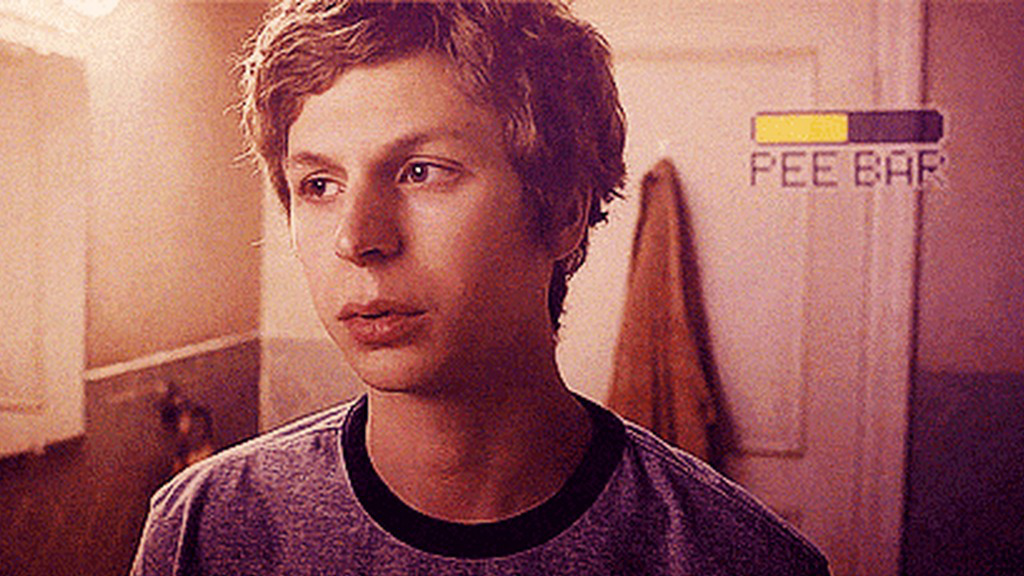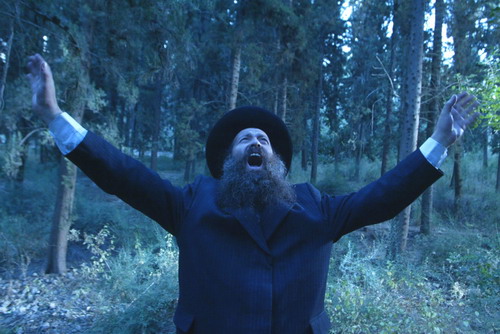Yankel, who used to be Jack, got kicked out of his last club on a Tuesday night. He wasn’t acting rowdy, not nearly as rowdy as the night when Nail and Anarchia brought the homemade volcano to the Dismemberment Plan concert, not even as crazy as the Godheadsilo show where he’d jumped from the balcony into the audience below. It wasn’t a 21+ show — not that that had mattered for quite a few years now. He even had I.D.It was the bouncer. He was a big shaved-head guy of indeterminate ethnicity, his face like a Disney gargoyle’s face frozen with a piece of sharp metal hanging out of it. The guy did have the metal, a whole row of hoops erupting out of his lower lip. He looked like every James Bond henchman at once.
He was doing a sweep of the crowd, making sure nobody was up to no good. It’s the hardest part of these shows, Yankel knew from experience. Over the years he’d worked both sides of the table. The guy passed over the guys with piercings sharper than knives, passed over the pot-huddle in the corner. And he stopped in front of Yankel.
Yankel pretended not to notice him. It worked every bit as well as it did when he was 16.
The guy gave him a shrug, crossed his arms. It wasn’t a fierce arm-crossing. It was just to show Yankel that he wasn’t impressed.
“What are you doin’ here, man?”
Yankel leaned forward.
“I’m sorry?” He cocked an ear. Maybe he’d misheard? “What is the problem, sir?”
He’d always been polite, no matter what else he had going on. He respected these guys. It was hard being paid to constantly be about to fight and never fighting.
The guy undid his arms. One of his hands he waved at Yankel. Vaguely at first, fanning the air around him, then zeroing in on his belly — his white shirt, his black vest, the stripes of his over-the-shirt tzitzis that his potbelly poked out like a family camper.
“You, man. It’s no problem, I ain’t kicking you out — but it’s you, man, what’s somebody like you doing here?”
Most nights Yankel didn’t come to these things alone. He brought friends, he found buddies. The few guys still in town from the old days, or someone from the forums. Yankel worked in computers, on the days when business was slow, he still logged onto the chat boards, eavesdropped on what people were saying about the bands he liked, which new bands were like them, lobbing insults at each other for musical taste, avatar use, lyrical quotes in their signatures. Yankel was brief and to the point. He tried never to insult people. His avatar was a gray profile. He didn’t have enemies. No friends, really, but everyone was his ally.
Tonight, though, none of his conspirators could make it. He came alone. Watched the opening band alone. Bought a beer for him and for nobody else. Stood alone in the corner between acts, drinking it as a substitute for between-sets small talk.
“I just come for the music. I like this music.”
The guy wasn’t buying it.
“You people have your own music, man. You ain’t here to dance, you hear to look. Listen. You wanna hook up, there’s a bar across the street, this trance bar, you can rub up against all the girls you want to over there. Girls, boys, whatever you’re after. Maybe take off your little cap next time, dress a little more low key.”
“No, you don’t understand — this band, I got all their albums, I got everything.”
“That’s all I’m saying,” said the guy, hands up, backing away. “That’s all.”
Yankel didn’t have to leave. Yankel left anyway. He listened to the first two songs of the next band’s set, his favorite band from when he’d started coming to these places — but there was no point. It was so long ago. You could hear it in the music, the band’s passion just wasn’t there anymore.
**
He can hear the goings-on inside his house from down the block. The screams get louder as he gets close. They are tiny, breathless, pathetic. The most incredibly syncopated rhythmic cries, like some weird Norwegian or Icelandic art-rock sampling crew.
He climbs the stairs to his apartment, kicks snow off his boots, removes his coat and heads straight for the dark room in the rear.
At once he is confronted.
“Yankie, please, take her.” She thrusts the baby into his hands. The little thing sits there, tiny arms drooping over his huge hands. “She’s been nonstop since dinnertime. I can’t do it anymore, I can’t make her stop.”
For a moment the tiny thing is confused. Then it regains its motivation, starts screaming again, its entire face contorted into the wrinkles around one huge gaping void of a mouth. There aren’t even teeth. No creature in G-d’s great Earth has ever screamed so mightily, so forcefully, and yet still produced such an insignificant squeak.
The door shuts hard. From the other room he can hear a rustle in the closet, a shuffle, a sigh, the welcome sound that the Netflix makes. She is such a special woman, and so selfless. He is unworthy of her.
But what he’s really unworthy of is this baby. This tiny beautiful creature who he has somehow contributed to the existence of. Even as she cries he wants to hug her, to squeeze her tight and protect her from the world, to find anything in the exile of our lives that could possibly be good enough for her.
He rocks her. He jiggles her. He puts a lullaby on the tape player; he tries reciting to her from Psalms, which always seemed like a good idea. He tries everything. From the other room, a fresh theme song. The episode has ended. Another is starting.
“Ba, ba, baba,” he coos softly in her ear. “Ba, ba, baba. I wanna be sedated.”
The tickle of his voice on her earlobe only protracts the worldly anxiety. Her scream becomes an uproar. Her entire body shudders with every blow.
He has no choice but to match it.
“When we have nothing left to give,” he sings, “there’ll be no reason for us to live.” The music screeches with urgency, the backing music in his mind, and he sings, louder now, “We owe you nothing,” again, “We owe you nothing,” and now he’s really screaming out, “We owe you nothing, you have no control,” and “You are not what you own,” and all the lyrics are tumbling out of him now, all the words to all the songs, and he is roaring them at the walls, roaring them against the night, against the world of exile, against his entire life, and remarkably, miraculously, the louder he goes he is like an all-encompassing tsunami, he is nature sounds, he is every white noise at once, and her eyes flutter, maybe taken by surprise or maybe just amused, and her mouth exercises into shapes, an O, an O, a horizontal I, and he is consumed by everything and she snuggles contentedly into the warmth of his exploding chest and settles into a perfect sleep.
Image by Jon Pack, who was very amenable about my waking him up in the middle of the night and asking if I could use it. Find more of his stuff here, or you can acquire some of his work for yourself right here. Lyrics sampled from Fugazi and the Ramones.













 We arrived at the airport and checked in at 6:02 AM. Turns out, Delta instituted a new policy -- YESTERDAY -- that you can't check in baggage less than an hour before a flight. Need I say that our flight was at 7:01? So the rest of the fam ran ahead, and I hung back to be the proud defender of our baggage.
We arrived at the airport and checked in at 6:02 AM. Turns out, Delta instituted a new policy -- YESTERDAY -- that you can't check in baggage less than an hour before a flight. Need I say that our flight was at 7:01? So the rest of the fam ran ahead, and I hung back to be the proud defender of our baggage.  So I did the same thing. Just straightened my posture, straightened my concentration, and started to pray. I don't know if anyone noticed -- anyone but myself, that is -- but I kind of got it going on. And I came out of it a little out of breath, a little sweaty (it is an airport, after all), but feeling pretty exhilarated. And it was the best praying I've had in a while. No one came up to me to compliment me on my praying skillz, but by the time I was done, I really thought they might.
So I did the same thing. Just straightened my posture, straightened my concentration, and started to pray. I don't know if anyone noticed -- anyone but myself, that is -- but I kind of got it going on. And I came out of it a little out of breath, a little sweaty (it is an airport, after all), but feeling pretty exhilarated. And it was the best praying I've had in a while. No one came up to me to compliment me on my praying skillz, but by the time I was done, I really thought they might.










